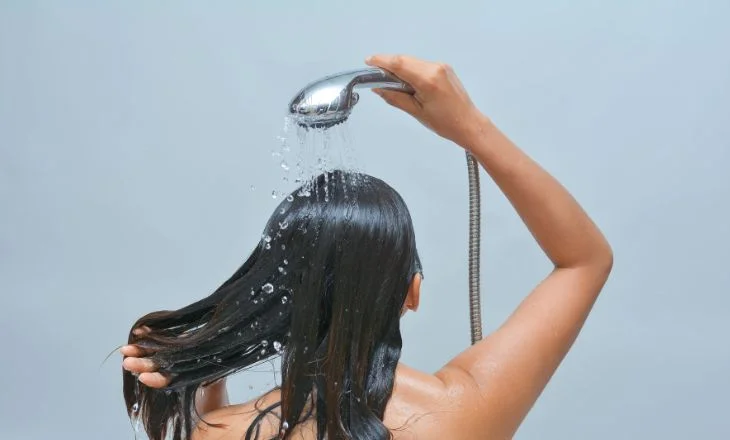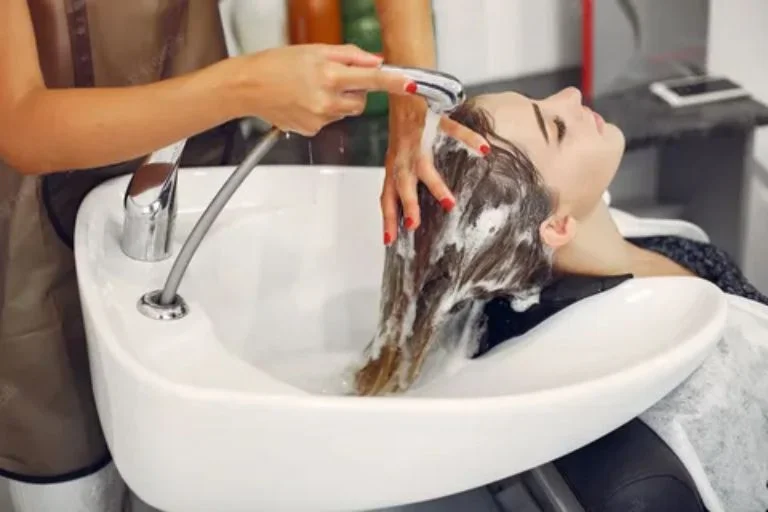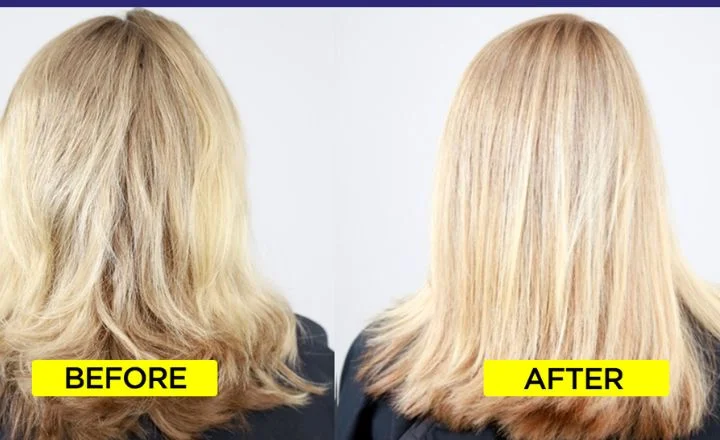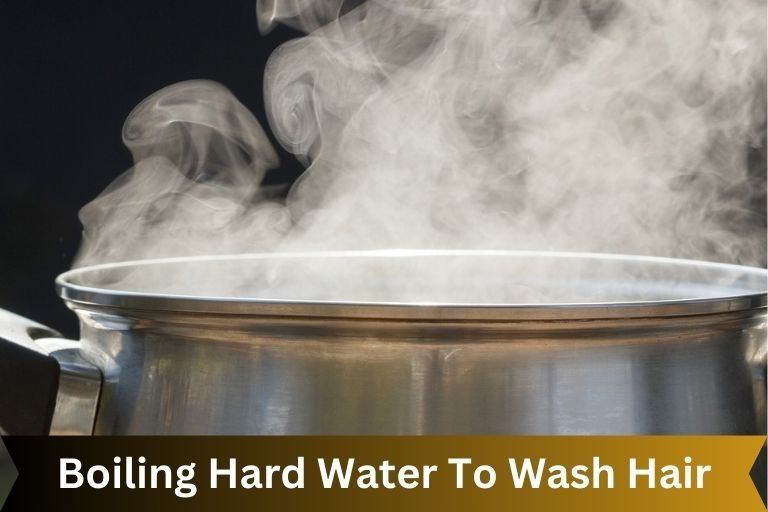In today’s world focused on sustainability and wellness, many people seek better ways to care for their hair. One interesting method that has become popular is boiling hard water for hair washing. This old practice is gaining attention from beauty lovers who want to use natural remedies to deal with the problems caused by mineral-rich tap water.
Hard water can make hair dull and dry, leaving it lifeless even after using commercial products. Boiling hard water can help by removing some minerals through heat and evaporation. This simple method can improve your washing experience and lead to shinier, healthier hair.
Let’s look at how boiling hard water for hair washing in 2024 is changing personal care routines, combining practicality with nostalgia for those seeking natural beauty solutions in a world full of chemicals.
Ways To Save Boiling Hard Water To Wash Hair
You can reuse boiling hard water for washing hair by adding natural ingredients. Try steeping herbs like chamomile or rosemary in the boiling water. These herbs can reduce hardness and offer benefits for your hair. Chamomile adds shine and soothes the scalp, while rosemary encourages growth and gives a fresh scent.
Another method is to capture steam from boiling hard water. You can do this with a simple DIY distillation setup. By cooling the steam, you collect distilled water, which has fewer minerals and impurities. This water is great for rinsing your hair after washing. It keeps your hair warm while reducing mineral buildup, especially if you often use hot styling tools that can dry out your hair.
Finally, using vinegar or citric acid as a pre-rinse can improve your hard-water routine. Mix one part vinegar with three parts boiled hard water. This mixture creates an acidic barrier that stops mineral deposits from sticking to your hair. It softens your hair, balances its pH, and improves manageability and shine without using harsh chemicals.
We will discuss some ways to save boiling hard water to wash hair.

Vinegar or Lemon Rinse
When dealing with hard water, both vinegar and lemon offer unique benefits that can transform your hair-washing routine into a revitalizing experience. Vinegar acts as a natural clarifying agent, effectively removing mineral build-up and leaving your locks feeling softer and shinier. When mixed with water in a simple rinse, it helps balance the scalp’s pH while combatting frizz, promoting a smoother texture even after just one use. The sour scent dissipates quickly, so there’s no need to worry about lingering odors; rather, you’ll emerge with hair that feels refreshed.
On the other hand, lemon juice provides an invigorating touch packed with vitamin C and antioxidants. Not only does it brighten dull strands but its citric acid content also aids in breaking down hard water deposits without stripping away essential oils like some harsh shampoos might do. The refreshing aroma can energize your washing ritual, turning an everyday task into a spa-like indulgence. Plus, using lemon is an eco-friendly alternative to commercially produced products—saving money and reducing plastic waste while delivering salon-worthy results right at home! Combining these rinses or alternating between them creates endless possibilities for achieving gorgeous hair without relying on chemical-based solutions.
Install A Shower Filter
Imagine stepping into the shower and feeling relaxed as soothing essential oils fill the air and warm water flows over you. But what if hard water ruins that peace and damage your hair? Installing a shower filter can change everything, turning your shower from a drying task into a refreshing experience. These filters remove chlorine, heavy metals, and other impurities from tap water, making your shower better and promoting healthier hair.
Every hair strand gets coated with harsh minerals that strip away moisture and shine. With one simple installation, you can help your hair feel softer and reduce frizz. Many filters are easy to install yourself, so you won’t need a professional. This makes it easy for anyone to upgrade their bathroom without spending a lot or dealing with complicated plumbing.
Also, a good filter can improve your skin by reducing irritation from chemicals in unfiltered water. That’s what we call multitasking!
Wash Hair With Bottled Water
Washing your hair with bottled water might seem fancy, but it can help if you have hard water. Hard water has a lot of minerals like calcium and magnesium, which can build up on your scalp and hair, making it look dull. Using bottled water, especially spring or distilled, gives your hair a fresh start without these harsh minerals. This switch can make your hair shinier and softer and help your shampoos and conditioners work better. Rinsing with bottled water helps avoid problems from hard water buildup and keeps your salon products effective.
You can also boil tap water to remove minerals before washing your hair. While this takes time, it’s a good way to deal with hard water without always using bottled water.
Use Water Out Of A Water Filter
Using filtered water can improve your hair care routine, especially if you have hard water. Hard water has high levels of minerals like calcium and magnesium, which can make your hair feel brittle and heavy. When you use filtered water, whether from a pitcher or a faucet, you’ll see an immediate difference.
Filtered water is softer, which helps cleanse and moisturize your hair better, keeping it shiny. It rinses away shampoo more effectively and allows conditioners to work deeply without harsh chemicals or mineral buildup. Soaking your hair in soft filtered water before applying products can help it absorb better, leading to healthier hair over time. This simple change not only improves your grooming but also helps the environment by reducing the use of plastic bottled water.
Rainwater
Using rainwater can improve your hair care routine, especially if you have hard water. Unlike tap water, which has high levels of calcium and magnesium, rainwater is soft and free from harsh minerals. This makes it great for washing your hair, as it helps keep moisture, adds shine, and reduces product buildup. Imagine showering with nature’s purest water—it’s like a quick hair treatment.
Collecting rainwater is easy. You can use simple rain barrels under your gutters for a steady supply without needing complicated setups. To make it even better, add natural herbs like rosemary or lavender to your barrel. They not only smell nice but also help your scalp. Using this rainwater instead of regular water can make your hair softer and less frizzy while also helping the environment by using what nature provides.
Use A Water Softener
Using a water softener can greatly improve hair health, especially for those with hard water. Hard water leaves mineral deposits that can weigh hair down and make it look dull. A good water softener improves your household water quality and helps your hair thrive.
With softer water, your shampoo will foam better and rinse out completely, leading to cleaner hair and a healthier scalp. Soft water also reduces the amount of product you need. With fewer minerals blocking hair follicles, you’ll use less conditioner for smooth hair. This can save you money on products and salon visits for hard water damage.
Soft water improves overall hygiene. Soaps lather better and cleanse your skin without drying it out. Appliances also work more efficiently with less mineral buildup. Choosing a water softener enhances your hair care routine and improves daily life at home.

How To Make Hard Water Soft For Hair
Transforming hard water into soft water for your hair is easier than you think. One effective way is to use a shower filter that removes minerals like calcium and magnesium, which cause hard water problems. Installing a filter improves your hair’s health and makes your bathing experience better. When the filtered water runs over your hair, you’ll see how well conditioner works, leaving your hair softer and easier to manage.
You can also try natural remedies. Rinsing your hair with diluted apple cider vinegar after shampooing helps reduce the effects of hard water. It adds shine and promotes a healthy scalp. The vinegar’s acidity breaks down mineral buildup and balances your hair’s pH. This simple rinse can become a pleasant part of your self-care routine while tackling hard water issues!
Does Hard Water Cause Hair Loss
Hard water is known for leaving mineral deposits on showerheads and fixtures, but it can also harm hair health. The high levels of calcium and magnesium can build up on the scalp and hair, causing dryness, brittleness, and frizz. This buildup can weaken hair over time and lead to scalp irritation, which may contribute to hair loss.
Hard water can affect how well shampoos and conditioners work. It can create soap scum that prevents proper cleaning and conditioning, leaving residues that weigh hair down and may clog hair follicles, hindering healthy growth.
To address this, many people use chelating shampoos that remove minerals from hard water. By understanding these issues, individuals can find solutions to protect their hair while dealing with the effects of hard water.
Hard Water Effects On Hair
Hard water contains high levels of minerals, mainly calcium and magnesium, which can harm your hair’s health and look. Many people notice dry, brittle hair or a rough texture, but the problems go deeper. These minerals can cause product buildup on your hair and scalp, making it hard for shampoos to clean properly.
This leads to dull hair that lacks shine. Hard water can also upset your scalp’s natural pH balance, causing irritation or worsening dandruff. It can strip away the oils that keep hair soft, so washing too often can make dryness worse.
To fight these issues, try using chelating shampoos. They are made to remove these minerals better than regular shampoos. Also, leaving a conditioning treatment on for a longer time can help restore moisture lost due to hard water. These steps can help you achieve healthier-looking hair. Hard water can also affect coloured or chemically treated hair. The minerals can mix with hair dyes, making the colour fade faster and look uneven.
Consider getting a water softener or clarifying shampoos regularly to protect your hair. This can help reduce the damage and keep your hair looking healthy and bright.
Can You Wash Your Hair With Just Water
Washing your hair with just water might seem like a good idea, especially with the trend towards simpler beauty routines. If you live in an area with hard water, this method can be hit or miss. Hard water has minerals like calcium and magnesium that can leave a residue on your hair, making it feel dull or straw-like after rinsing. Instead of feeling clean, you might struggle with dullness and tangles that regular shampoo would usually fix.
Your scalp health also depends on more than just being clean; it needs proper nourishment. Washing with only water doesn’t effectively remove oil buildup or residue from styling products, especially if you use products with oils or silicones. This can lead to itchiness or an imbalance in your scalp’s oil production over time.
Some people believe that your scalp will adjust to washing with just water, but those with hard water may not have the same success as those with softer water. To keep your hair healthy, consider adding clarifying treatments to your routine along with regular washing. This can help balance the effects of hard water and keep your hair vibrant.

Conclusion
Boiling Hard Water To Wash Hair In 2024 can significantly improve the overall health and appearance of your locks. By removing excess minerals that cause build-up and dryness, this simple yet effective method allows for a more nourishing hair care routine.
Incorporating this practice into your regimen not only enhances the effectiveness of your hair products but also promotes scalp health. As we continue to seek innovative ways to tackle common hair challenges, boiling hard water emerges as a practical solution worthy of consideration. So why not give it a try and experience the difference for yourself? Consider using a clarifying shampoo or investing in a water-softening system for long-term benefits.
Taking care of your hair by addressing the water quality it is exposed to can lead to healthier and more vibrant locks. Take action today to make a positive change in your hair care routine!
Frequently Asked Question
1. How Do You Get Hard Water Out Of Your Hair At Home?
Vinegar, baking soda, lemon juice, or a clarifying shampoo can help remove hard water buildup from hair.
2. What is hard water and how does it affect my hair?
Hard water contains high levels of minerals, primarily calcium and magnesium, which can lead to buildup on the hair, making it feel dull and difficult to manage.
3. How long should I boil the water for effective treatment?
Boil the water for at least 10-15 minutes to allow minerals to settle. Let it cool down before using it for washing your hair.

